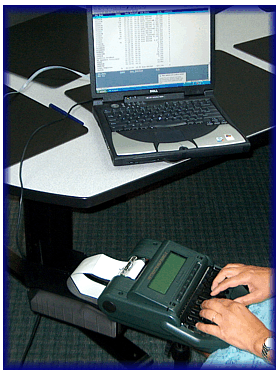
 The United States is one of the most litigious countries in the world. Every day, millions of Americans bring legal action against their fellow citizens, and while it might not be good for them, court reporters have reaped the benefits of all these court cases.
The United States is one of the most litigious countries in the world. Every day, millions of Americans bring legal action against their fellow citizens, and while it might not be good for them, court reporters have reaped the benefits of all these court cases.
Yes, court reporters are in demand now more than ever, but some states feature more opportunities than others. The following is a list of the best states for court reporters in terms of the demand for their services (cost of living, quality of life and other issues have not been included in this discussion).
The seven best states to be a court reporter
1. California – The biggest state in the country is also the most litigious. Court reporters in California are always in demand around the major urban centers of Los Angeles, San Francisco, Sacramento and San Diego and the countless small towns in between.
2. Florida – With its huge elderly population, Florida is also home to countless disputes over the estates of its deceased residents. That means there will be a call for court reporters to record depositions and court hearings regarding will, trusts and other estate planning matters.
3. New York – Inside New York State you’ll find Manhattan, and in Manhattan you will find the
most vibrant legal community in the world. Court reporters in New York can take on more work in the course of a day because of the physical proximity of all the law offices in Manhattan.
4. Illinois – Not much going on in Illinois…oh, except for Chicago – home to some of the most well-regarded legal minds in the country. Chicago court reporters may be called to work on Federal cases as well as those regarding the byzantine, always colorful local political scene.
5. Texas – Texas court reporters may find themselves working on a wide variety of case types
on any given day. The Lone Star State is home to immigration cases, large corporate anti-trust suits and even narcotics-related cases stemming the activity of drug cartels operating across the border in Mexico.
6. Nevada – The fastest growing state in the U.S., Nevada is a good place for a court reporter to set up shop. Because the population growth is such a recent occurrence, there is a chance for a court reporter to establish a comprehensive “network” as a trusted source on Nevada legal proceedings (as they pertain to court reporting and the filing of legal documents).
7. Louisiana – With Hurricane Katrina came a bevy of legal proceedings. Although it has been two years since the storm, there will likely be enough litigation in the New Orleans area alone to last for many years. Since many skilled professionals left the area after the Great Storm, there is a high demand for court reporters in the area.
For the best court reporters around the country, visit www.CourtReporterNet.com. CourtReporterNet.com is the one-stop source for all your Court Reporting, videography and Transcription needs. Powered by innovative technologies, and a professional customer support staff, CourtReporterNet.com is sure to meet your complete satisfaction. The court reporters of CourtReporterNet.com are currently available in New York, California, Florida, Chicago and other areas throughout the United States.





